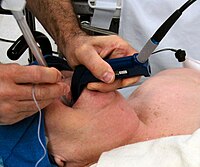
Photo from wikipedia
An 84-year-old woman underwent soft palate resection and skin grafting with tie-over under general anesthesia. Fourteen years previously, she had undergone aortic valve replacement and coronary artery bypass grafting followed… Click to show full abstract
An 84-year-old woman underwent soft palate resection and skin grafting with tie-over under general anesthesia. Fourteen years previously, she had undergone aortic valve replacement and coronary artery bypass grafting followed by lifelong warfarin and aspirin anticoagulation. We terminated the two drugs 8 and 6 days, respectively, before the present surgery and substituted intravenous heparin (10,000 units/day), which was terminated 6 h preoperatively. The surgery was uneventful. Heparin was restarted 2 days postoperatively but without warfarin potassium or aspirin because of postoperative soft palate bleeding, which continued for 10 days despite compression hemostasis. On day 10, she exhibited a suffocating large hemorrhagic mass, leading to cardiopulmonary arrest. Emergency consultation with medical doctors and dental anesthetists resulted in pulmonary resuscitation and tracheal intubation. After confirming spontaneous circulation/respiration, she was transferred to the intensive care unit. We now consider it essential that all medical/surgical/anesthesia specialists managing patients under anticoagulant therapy collaborate perioperatively.
Journal Title: Case Reports in Dentistry
Year Published: 2021
Link to full text (if available)
Share on Social Media: Sign Up to like & get
recommendations!